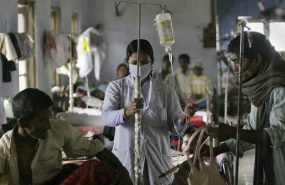COVID-19 lessons: what can make the HIV programs in the EECA countries more sustainable? (LIVE discussion)
- 29.04.2020 13:35
- Post Views: 931
Obviously, some of the changes brought forth by COVID-19 (simplification of patent regulations, modification of client program management and the use of online formats, simplification of drug users policing, amnesty for drug users in some countries) should continue after COVID-19, furthermore, they will significantly increase the sustainability of HIV programs in the future.
In the framework of the special broadcast, the experts will present their arguments for the sustainability of HIV programs based on the COVID-19 lessons in terms of such aspects, as:
- Access to HIV medicines and diagnostics,
- HIV services for key populations,
- Drug policy,
- Strengthening of the national health systems.
Focus: on the new opportunities to boost sustainability, not on reporting the problems!
Broadcast speakers:
- Fifa Rahman (Malaysia), expert on intellectual property and improving access to medicines, UNITAID board member
Topic: Simplification of access to medicines and diagnostics
- Anton Basenko (Ukraine), expert on drug policy, community, gender and human rights, Alliance for Public Health
Topic: Simplification of services provision models for vulnerable groups in the region – which of the improved practices should be maintained after COVID-19
- Niamh Eastwood (UK), Executive Director of the Release – the British center of expertise on drugs and drugs law
Topic: Decriminalization of drug use for personal purposes and amnesty for the convicts
- Volodymyr Kurpita (Ukraine), expert on public health and HIV/AIDS
Topic: Changes to be made in the healthcare system: COVID19 lessons for HIV sustainability
Moderator: Andriy Klepikov, Executive Director of the Alliance for Public Health, Global Fund To Fight AIDS, TB & Malaria Member of the Board form the Developing Countries NGO Delegation.
Speakers will tell in detail what can be simplified, optimized, improved in the existing healthcare systems in the context of the COVID-19 pandemic impact, so that countries become more efficient and better prepared for similar challenges in the future.
The broadcast will be in English with simultaneous interpretation into Russian.
You can watch live discussion on the website or through social media: Facebook (ru) and Youtube (eng).
Start: On May 5, 2020, from 11:00 a.m. to 1:00 p.m. EST (UTC+3)
Related News
Global Fund Strategy Development – Open Consultation Questions
COVID-19 is radically altering global health, politics and economics, and the impact upon programs fighting HIV, TB and malaria will likely be tremendous. The new pandemic could completely derail our vast efforts of the past 20 years. At the same time, it has galvanized public awareness on global health security in a way that builds […] Read moreGlobal Fund Technical Brief Tuberculosis, Gender and Human Rights
The purpose of this technical brief is: to assist Global Fund applicants to consider how to include programs to remove human rights and gender-related barriers to tuberculosis prevention, diagnosis and treatment services within funding requests, and to help all stakeholders ensure that TB programs promote and protect human rights and gender equality. Post Views: 935 Read moreGlobal Fund Technical brief on HIV and key populations Programming at scale with sex workers, men who have sex with men, transgender people, people who inject drugs, and people in prison and other closed settings
The purpose of this technical brief is to provide information for countries preparing funding requests for comprehensive programs that address the cascade of HIV prevention, diagnosis, treatment, and care for the following key populations: male, female, and transgender sex workers, gay men and other men who have sex with men, transgender people (especially transgender women), […] Read moreServices for migrants and refugees from Ukraine – HIV/TB care with a focus on key populations
Due to the increasing flows of refugees from Ukraine because of Russia’s invasion of Ukraine, the EECA Regional Platform created a spreadsheet to fill contacts details of face-to-face and online services for refugees and migrants (with a focus on HIV/TB care and key population groups).
Regional Platform – EECA
This web-resource is a part of new regional communication and coordination project “Regional Civil Society and Community Support, Coordination and Communication Platform - EECA”, implemented by Eurasian Harm Reduction Association (EHRA).
Tags
See also
-
EECA’s Regional Platform monthly Newsletter #20, January 2026 27.01.2026 12:58
-
Global Fund Eligibility List 2026 27.01.2026 11:19







